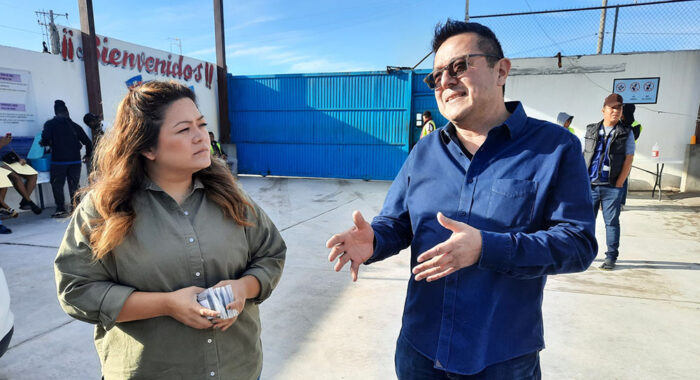
The significant increase in immigration and the growing stridency of the national debate on immigration compel the National Association of Evangelicals to speak boldly and biblically to this challenging topic. The complexity of immigration issues provides an opportunity to mine Scripture for guidance. A biblically informed position provides a strong platform for the NAE to make a contribution in the public square that will be explicitly Christian. Out of commitment to Scripture and knowledge of national immigration realities comes a distinct call to action.
Biblical Foundations
Discussion of immigration and government immigration policy must begin with the truth that every human being is made in the image of God (Genesis 1:26-28). Immigrants are made in the image of God and have supreme value with the potential to contribute greatly to society. Jesus exemplifies respect toward others who are different in his treatment of the Samaritans (Luke 10:30-37; John 4:1-42).
The Bible contains many accounts of God’s people who were forced to migrate due to hunger, war, or personal circumstances. Abraham, Isaac, Jacob and the families of his sons turned to Egypt in search of food. Joseph, Naomi, Ruth, Daniel and his friends, Ezekiel, Ezra, Nehemiah, and Esther all lived in foreign lands. In the New Testament, Joseph and Mary fled with Jesus to escape Herod’s anger and became refugees in Egypt. Peter referred to the recipients of his first letter as “aliens” and “strangers,” perhaps suggesting that they were exiles within the Roman Empire. These examples from the Old and New Testaments reveal God’s hand in the movement of people and are illustrations of faith in God in difficult circumstances.
Migration was common in the ancient world. Outsiders were particularly vulnerable. They stood outside the kinship system that regulated the inheritance of property. They did not have extended family to care for them in case of need. The Law recognized their helplessness and stipulated measures that served as a safety net. The motivations behind this generous spirit were that the people of God were not to forget that they had been strangers in Egypt (Exodus 22:21; Leviticus 19:33-34) and that God loved the foreigner (Deuteronomy 10:18-19). The New Testament adds that all believers are spiritual sojourners on earth (Phil. 3:20; 1 Peter 2:11). Christians should show compassion and hospitality to outsiders (Rom. 12:13; Heb. 13:2).
The Bible does not offer a blueprint for modern legislation, but it can serve as a moral compass and shape the attitudes of those who believe in God. An appreciation of the pervasiveness of migration in the Bible must temper the tendency to limit discussions on immigration to Romans 13 and a simplistic defense of “the rule of law.” God has established the nations (Deut. 32:8; Acts 17:26), and their laws should be respected. Nevertheless, policies must be evaluated to reflect that immigrants are made in the image of God and demonstrate biblical grace to the foreigner.
National Realities
Immigration is a worldwide phenomenon. People migrate due to economic globalization, armed conflicts, and a desire to provide for their families. The United States of America is a country founded by immigrants, and its history has been characterized by waves of immigrants from different parts of the world. Immigrants will continue to be an essential part of who we are as a country. Our response to immigration must include an understanding of this immigrant history and an awareness of the positive impact of multiple cultures on national life over the last 250 years. The challenge today is to determine how to maintain the integrity of national borders, address the situation with millions of undocumented immigrants, devise a realistic program to respond to labor needs, and manifest the humanitarian spirit that has characterized this country since its founding.
The problems related to immigration are many and complicated. In many instances the arrival of a large number of immigrants has compromised the border. Some communities now struggle with significant stress on infrastructures in education, health care, social services, and the legal system. At the same time, many jobs and industries rely on immigrant workers. Current quotas do not grant enough visas to meet these needs, nor does federal immigration law provide sufficient opportunities to others who also come seeking gainful employment. Many immigrants who obtain legal entry yearn to be reunited with families, but backlogs under family-based immigration law result in excessive periods of family separation.
Due to the limited number of visas, millions have entered the United States without proper documentation or have overstayed temporary visas. While these actions violate existing laws, socioeconomic, political, and legal realities contribute to the problematic nature of immigration. Society has ignored the existence of an unauthorized work force due to the economic benefits of cheap immigrant labor. Without legal status and wary of reporting abuses, immigrants can be mistreated and underpaid by employers. Deportation of wage-earners has separated families and complicated the situation for many. Most undocumented immigrants desire to regularize their legal status, but avenues to assimilation and citizenship are blocked by local, state, and federal laws. This has generated an underground industry for false documentation and human smuggling.
These quandaries offer fresh opportunities for the church. Immigrant communities offer a new, vibrant field for evangelism, church planting, and ministry. Denominations have launched efforts to bring the gospel to these newcomers, establish churches, and train leaders for immigrant believers. Millions of immigrants also come from Christian backgrounds. These brothers and sisters in Christ are revitalizing churches across the country and are planting churches and evangelizing. Their presence is a blessing of God. These spiritual realities remind evangelicals that an evaluation of recent immigration cannot be reduced to economics and national security issues.
Call to Action
Motivated by the desire to offer a constructive word for the country’s complicated immigration situation and guided by the Scripture, the National Association of Evangelicals calls for the reform of the immigration system. We believe that national immigration policy should be considerate of immigrants who are already here and who may arrive in the future and that its measures should promote national security and the general welfare in appropriate ways. Building upon biblical revelation concerning the migration of people and the values of justice and compassion championed in “For the Health of the Nation: An Evangelical Call to Civic Responsibility,” we urge:
- That immigrants be treated with respect and mercy by churches. Exemplary treatment of immigrants by Christians can serve as the moral basis to call for government attitudes and legislation to reflect the same virtues.
- That the government develop structures and mechanisms that safeguard and monitor the national borders with efficiency and respect for human dignity.
- That the government establish more functional legal mechanisms for the annual entry of a reasonable number of immigrant workers and families.
- That the government recognize the central importance of the family in society by reconsidering the number and categories of visas available for family reunification, by dedicating more resources to reducing the backlog of cases in process, and by reevaluating the impact of deportation on families.
- That the government establish a sound, equitable process toward earned legal status for currently undocumented immigrants, who desire to embrace the responsibilities and privileges that accompany citizenship.
- That the government legislate fair labor and civil laws for all residing within the United States that reflect the best of this country’s heritage.
- That immigration enforcement be conducted in ways that recognize the importance of due process of law, the sanctity of the human person, and the incomparable value of family.
Resources
“Blessed are the Courageous.” Christianity Today, April 3, 2006.
http://www.christianitytoday.com/ct/2006/aprilweb-only/114-12.0.html. Vol. 50, April (Web-only) 2006.
Carroll R., M. Daniel. Christians at the Border: Immigration, the Bible and the Church. Baker Academic, 2008.
Galli, Mark. “Blessed is the Law – Up to a Point.” Christianity Today, April 7, 2006.
http://www.christianitytoday.com/ct/2006/aprilweb-only/114-53.0.html?start=1. Vol. 50, April (Web-only) 2006.
Soerens, Matthew and Jenny Hwang. Welcoming the Stranger: Justice, Compassion & Truth in the Immigration Debate. InterVarsity, 2009.
NAE Resolutions on Immigration:
Compassion for Immigrants and Refugees 1995
Immigration 2006
National Hispanic Christian Leadership Conference
Resolutions on immigration by NAE member denominations:
Evangelical Free Church of America
Vineyard Church (pdf)
Wesleyan Church



 View All Updates
View All Updates 


























